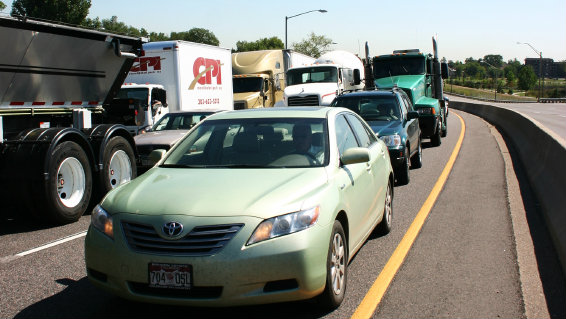
Under the contract, Plenary will finish construction on the road, including adding a third lane in each direction that will be tolled. Plenary will also be responsible for maintaining that stretch of road, and a piece of I-25, for the life on the contract, doing things like filling potholes and removing snow.
In exchange, Plenary will collect revenue on the toll lanes. The contract lasts 50 years.
CDOT's arrangement with Plenary has drawn a lot of ire over the past few weeks. But CDOT has indicated it plans to replicate the model for future improvements, including to I-70 and I-25. And Colorado’s not the only state turning to public-private partnerships as revenues from gas taxes and assistance from the federal government have stagnated.
From Pennsylvania to California, states are using so-called P3s, or PPPs, to get new money into the system, just like CDOT is doing with highway 36. In fact, several states are ahead of Colorado in experimenting with these arrangements.
That does not mean all public-private partnerships are good, according to Rick Geddes, director of the infrastructure policy program at Cornell University.
"I think it's best to think about public-private partnerships as marriages, in the sense that some of them are good and some of them are bad, but overall hopefully we view the institution of marriage as a positive thing," Geddes said.
"Maybe like a marriage contract, sometimes that contractual relationship can break down over different types of disagreements, and sometimes that contractual relationship can grow and become mutually beneficial over time," Geddes said.
There are benefits for each side, generally speaking: CDOT has said that the infusion of capital Plenary is providing will allow the state to finish the construction project far sooner than CDOT could do it. And Plenary and its investors will get a continuous stream of revenue for the next 50 years.
Geddes said it's more complicated than that, though. Plenary will also take on the risk of potentially low revenues from the toll--a risk that would otherwise be borne by taxpayers.
Still, many residents say the deal will end up benefitting Plenary far more than it will benefit Colorado. They are upset that a private company based partly in Australia will collect the toll money for several decades into the future.
Geddes sees it differently. “[Plenary] cannot take that road back to Australia," Geddes said. "Once they have put the money into designing and constructing that facility for us, that investment is sunk. It’s irreversible. They’re the ones taking a risk on us that we might renege on those contract terms.”
Additionally, Geddes said that many of the projects now subject to public-private partnerships wouldn't otherwise get done at all.
One of the more contentious aspects of the highway 36 deal is the perception that CDOT negotiated the contract in private and didn't make details public to residents or lawmakers until very recently, although in 2009 lawmakers gave CDOT the authority to enter into P3s for road projects.
Geddes said the perception of secrecy is a common problem with P3s nationwide, pointing to a deal to improve the Pennsylvania Turnpike that fell through at the last moment.
“That deal fell through in part because of a failure to bring along the public," Geddes said.
Critics in Colorado hope the same thing will happen here. One group has already filed a lawsuit aimed at slowing or stopping the highway 36 deal from going through.









